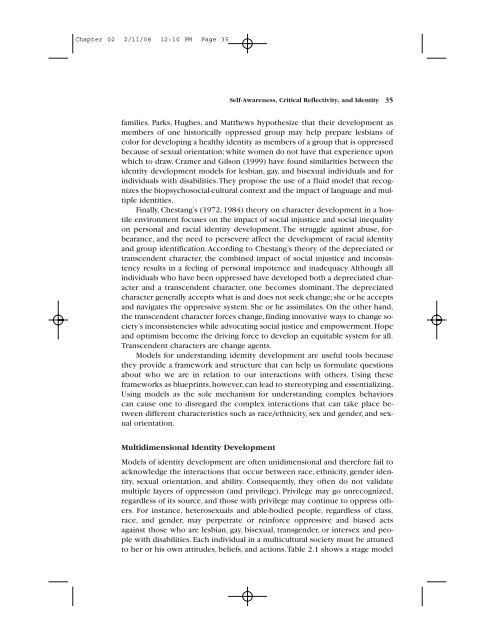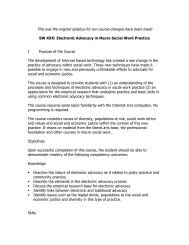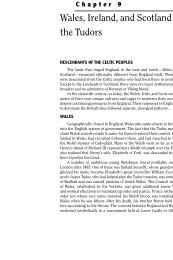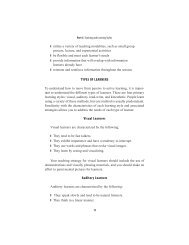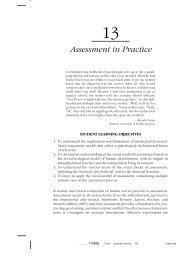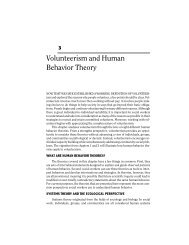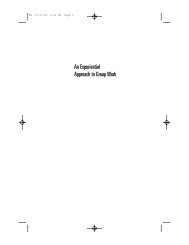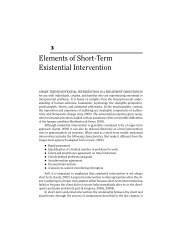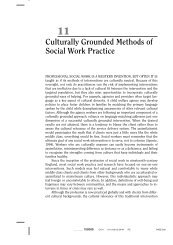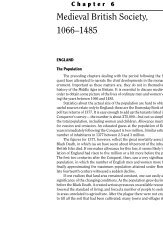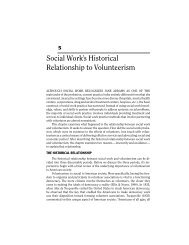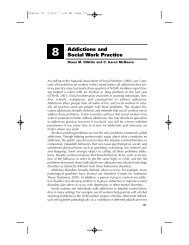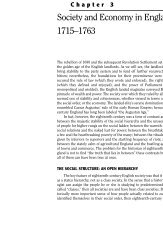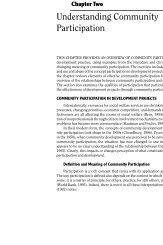Chapter 2 Self-Awareness, Critical Reflectivity, and ... - Lyceum Books
Chapter 2 Self-Awareness, Critical Reflectivity, and ... - Lyceum Books
Chapter 2 Self-Awareness, Critical Reflectivity, and ... - Lyceum Books
You also want an ePaper? Increase the reach of your titles
YUMPU automatically turns print PDFs into web optimized ePapers that Google loves.
<strong>Chapter</strong> 02 2/11/08 12:10 PM Page 35<br />
<strong>Self</strong>-<strong>Awareness</strong>, <strong>Critical</strong> <strong>Reflectivity</strong>, <strong>and</strong> Identity 35<br />
families. Parks, Hughes, <strong>and</strong> Matthews hypothesize that their development as<br />
members of one historically oppressed group may help prepare lesbians of<br />
color for developing a healthy identity as members of a group that is oppressed<br />
because of sexual orientation; white women do not have that experience upon<br />
which to draw. Cramer <strong>and</strong> Gilson (1999) have found similarities between the<br />
identity development models for lesbian, gay, <strong>and</strong> bisexual individuals <strong>and</strong> for<br />
individuals with disabilities.They propose the use of a fluid model that recognizes<br />
the biopsychosocial-cultural context <strong>and</strong> the impact of language <strong>and</strong> multiple<br />
identities.<br />
Finally, Chestang’s (1972, 1984) theory on character development in a hostile<br />
environment focuses on the impact of social injustice <strong>and</strong> social inequality<br />
on personal <strong>and</strong> racial identity development. The struggle against abuse, forbearance,<br />
<strong>and</strong> the need to persevere affect the development of racial identity<br />
<strong>and</strong> group identification.According to Chestang’s theory of the depreciated or<br />
transcendent character, the combined impact of social injustice <strong>and</strong> inconsistency<br />
results in a feeling of personal impotence <strong>and</strong> inadequacy. Although all<br />
individuals who have been oppressed have developed both a depreciated character<br />
<strong>and</strong> a transcendent character, one becomes dominant. The depreciated<br />
character generally accepts what is <strong>and</strong> does not seek change;she or he accepts<br />
<strong>and</strong> navigates the oppressive system. She or he assimilates. On the other h<strong>and</strong>,<br />
the transcendent character forces change,finding innovative ways to change society’s<br />
inconsistencies while advocating social justice <strong>and</strong> empowerment. Hope<br />
<strong>and</strong> optimism become the driving force to develop an equitable system for all.<br />
Transcendent characters are change agents.<br />
Models for underst<strong>and</strong>ing identity development are useful tools because<br />
they provide a framework <strong>and</strong> structure that can help us formulate questions<br />
about who we are in relation to our interactions with others. Using these<br />
frameworks as blueprints, however, can lead to stereotyping <strong>and</strong> essentializing.<br />
Using models as the sole mechanism for underst<strong>and</strong>ing complex behaviors<br />
can cause one to disregard the complex interactions that can take place between<br />
different characteristics such as race/ethnicity, sex <strong>and</strong> gender, <strong>and</strong> sexual<br />
orientation.<br />
Multidimensional Identity Development<br />
Models of identity development are often unidimensional <strong>and</strong> therefore fail to<br />
acknowledge the interactions that occur between race, ethnicity, gender identity,<br />
sexual orientation, <strong>and</strong> ability. Consequently, they often do not validate<br />
multiple layers of oppression (<strong>and</strong> privilege). Privilege may go unrecognized,<br />
regardless of its source, <strong>and</strong> those with privilege may continue to oppress others.<br />
For instance, heterosexuals <strong>and</strong> able-bodied people, regardless of class,<br />
race, <strong>and</strong> gender, may perpetrate or reinforce oppressive <strong>and</strong> biased acts<br />
against those who are lesbian, gay, bisexual, transgender, or intersex <strong>and</strong> people<br />
with disabilities. Each individual in a multicultural society must be attuned<br />
to her or his own attitudes, beliefs, <strong>and</strong> actions.Table 2.1 shows a stage model


